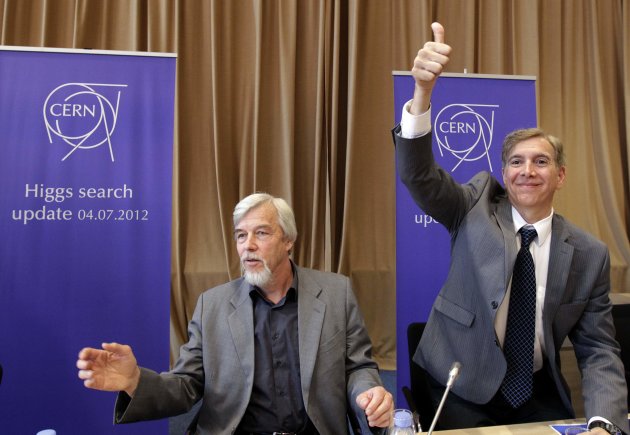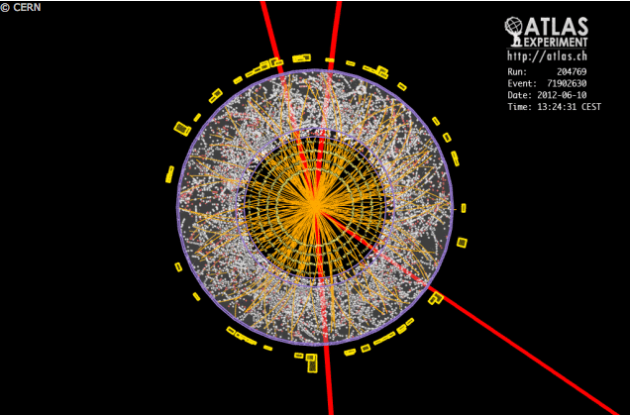Scientists at Europe's CERN research center have found a new subatomic particle, a basic building block of the universe, which appears to be the boson imagined and named half a century ago by theoretical physicist Peter Higgs (July 4).
FILE - In this March 30, 2010 file photo a scientist looks at the pictures of the first collisions at full power at the CMS experience control room at the European Organisation for Nuclear Research (CERN) in Meyrin near Geneva, Switzerland. The head of the world's biggest atom smasher is claiming discovery of a new particle that he says is consistent with the long-sought Higgs boson known popularly as the "God particle" which is believed to give all matter in the universe size and shape.
Participants applaud after the presentation results during a scientific seminar to deliver the latest update in the search for the Higgs boson at the European Organization for Nuclear Research (CERN) in Meyrin near Geneva July 4, 2012.
oe Incandela (R), CMS experiment spokeperson, gestures next to Rolf Heuer, CERN Director General, at the start of a news conference update in the search for the Higgs boson at the European Organization for Nuclear Research (CERN) in Meyrin near Geneva July 4, 2012. REUTERS/Denis Balibouse
Pier Oddone of Fermilab talks during the Australian Science Media Centre background briefing on the search for the Higgs boson in Melbourne July 4, 2012. Scientists hunting the elusive subatomic "Higgs" particle will unveil findings on Wednesday that take them nearer to understanding how the Big Bang at the dawn of time gave rise to stars, planets and even life.
'God Particle' 'Discovered': European Researchers Claim Discovery of Higgs Boson-Like Particle
Nobel Prize winning physicist Leon Lederman speaks at the panel discussion "Pioneers in Science" at the World Science Festival held at The Graduate Center, Proshansky Auditorium, CUNY on May 29, 2008 in New York City.
Possible 'God Particle' Discovery Is Gossip for Physicists
Has the 'God Particle' Been Found?
FILE - This Thursday, March 22, 2007 file photo shows the magnet core of the world's largest superconducting solenoid magnet (CMS, Compact Muon Solenoid) at the European Organization for Nuclear Research (CERN)'s Large Hadron Collider (LHC) particule accelerator in Geneva Switzerland. Scientists at CERN will hold a public seminar Tuesday Dec. 13, 2011 to present their latest findings from the search for an elusive sub-atomic particle known as the Higgs boson. Physicists are increasingly confident that they have narrowed down the place where it will be found and may even already have hints at its existence hidden away in reams of data.
FILE - In this Thursday, March 22, 2007 file photo two engineers works to assemble one of the layers of the world's largest superconducting solenoid magnet (CMS, Compact Muon Solenoid) at the European Organization for Nuclear Research (CERN)'s Large Hadron Collider (LHC) particule accelerator, in Geneva, Switzerland. Scientists at CERN will hold a public seminar Tuesday Dec. 13, 2011 to present their latest findings from the search for an elusive sub-atomic particle known as the Higgs boson. Physicists are increasingly confident that they have narrowed down the place where it will be found and may even already have hints at its existence hidden away in reams of data.
FILE - In this March 30, 2010 file photo a scientist looks at the pictures of the first collisions at full power at the CMS experience control room at the European Organisation for Nuclear Research (CERN) in Meyrin near Geneva, Switzerland. The head of the world's biggest atom smasher is claiming discovery of a new particle that he says is consistent with the long-sought Higgs boson known popularly as the "God particle" which is believed to give all matter in the universe size and shape.
Participants applaud after the presentation results during a scientific seminar to deliver the latest update in the search for the Higgs boson at the European Organization for Nuclear Research (CERN) in Meyrin near Geneva July 4, 2012. REUTERS/Denis Balibouse













No comments:
Post a Comment